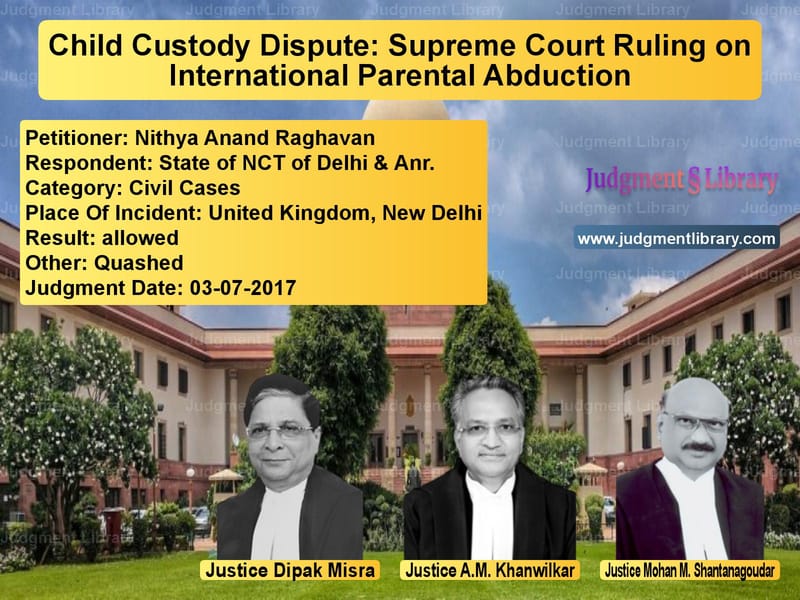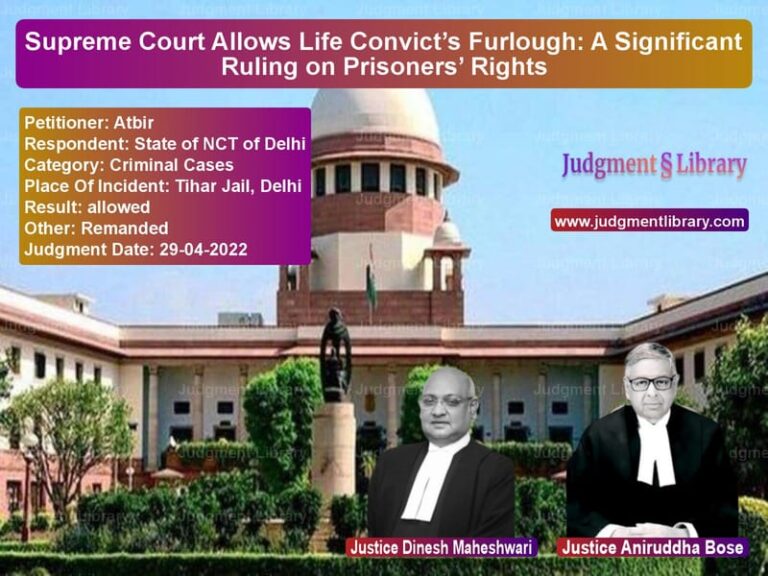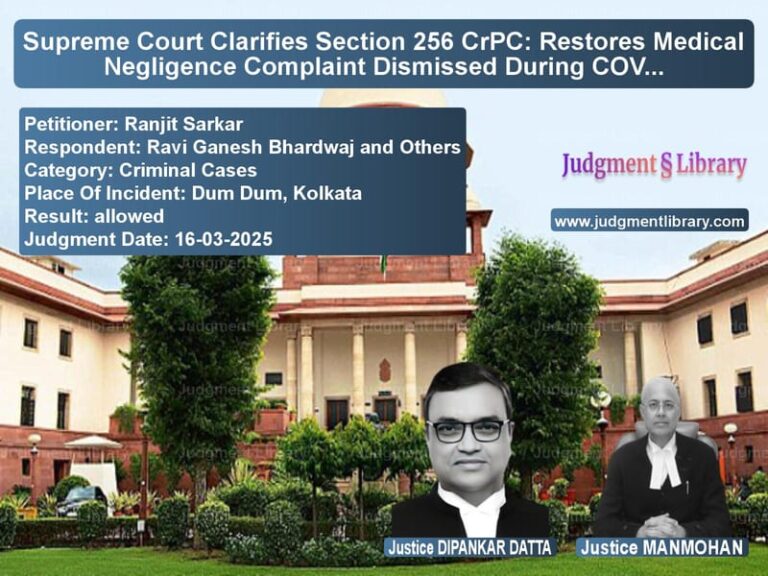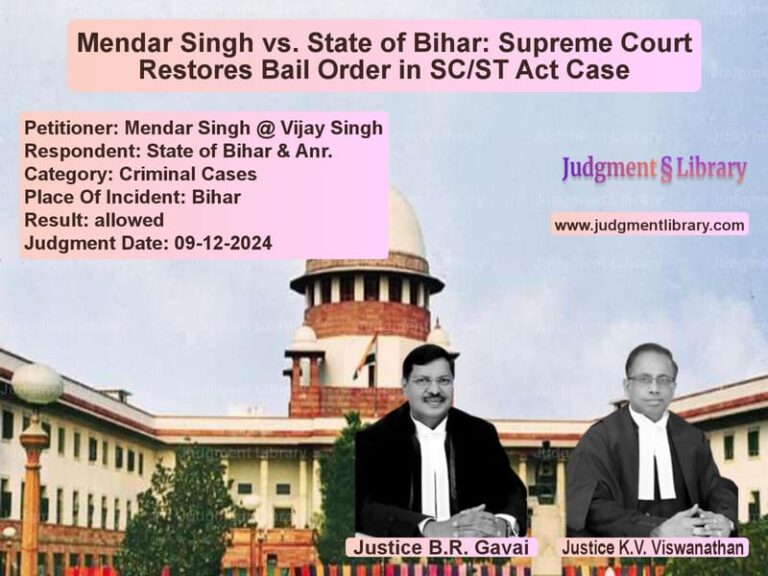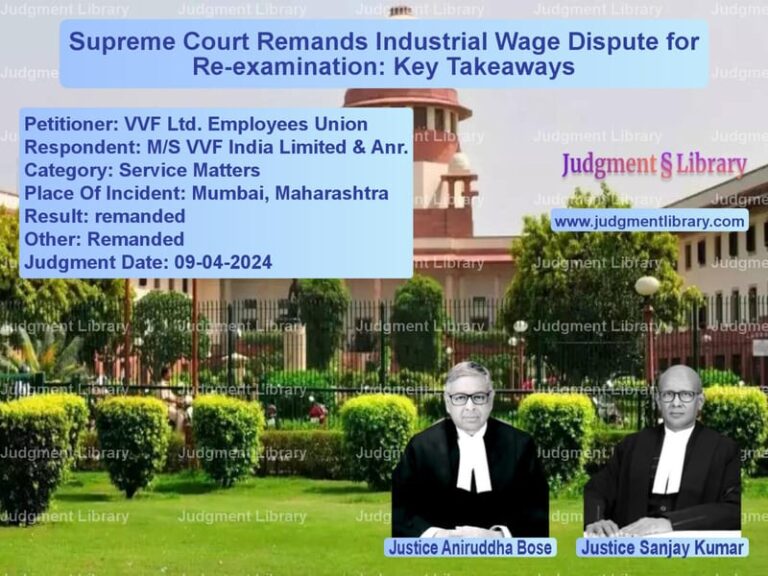Child Custody Dispute: Supreme Court Ruling on International Parental Abduction
The case of Nithya Anand Raghavan v. State of NCT of Delhi & Anr. revolves around the sensitive and complex issue of child custody in international parental abduction cases. The Supreme Court of India was called upon to determine whether a child, who was allegedly wrongfully removed from the United Kingdom to India by her mother, should be returned as per the order of the UK court or remain in the custody of her mother in India.
Background of the Case
The dispute arose when the petitioner, Nithya Anand Raghavan, removed her minor daughter, Nethra, from the UK and brought her to India in July 2015. The child’s father, the second respondent, Anand Raghavan, filed a habeas corpus petition before the Delhi High Court, arguing that the child had been wrongfully removed from the UK and should be returned in compliance with an order issued by the High Court of Justice, Family Division, UK.
The Delhi High Court ruled in favor of the father and directed the mother to return the child to the UK. Aggrieved by this decision, the mother approached the Supreme Court, arguing that the best interest and welfare of the child should be given paramount consideration over the principle of comity of courts.
Key Issues Before the Supreme Court
- Whether the principle of comity of courts should override the welfare of the child.
- Whether the child was wrongfully removed from the UK and retained in India.
- Whether the order of the UK court should be enforced by Indian courts.
- What is the role of the parens patriae jurisdiction of Indian courts in cases involving minors?
Arguments of the Petitioner (Mother)
The petitioner, represented by Advocate Malavika Rajkotia, contended:
- The child was born in India and retained her Indian citizenship despite later acquiring UK citizenship.
- The child had been living in India for over a year, attending school and establishing social ties.
- Returning the child to the UK would expose her to physical, psychological, and emotional harm due to alleged domestic violence by the father.
- Indian courts, having parens patriae jurisdiction, should independently assess the child’s best interest rather than mechanically enforcing a foreign court’s order.
- The UK court’s order was passed ex parte (without hearing her side), and thus, should not be blindly implemented.
- The child had a cardiac condition that required medical attention, and the mother was the best caregiver.
Arguments of the Respondent (Father)
The respondent, represented by Advocate S.S. Jauhar, countered:
- The child was a British citizen by birth and had spent most of her life in the UK.
- The UK courts had intimate contact and jurisdiction over the matter.
- The child’s removal to India was wrongful and in violation of UK laws.
- The mother had previously agreed to UK citizenship for the child, demonstrating intent to settle in the UK.
- The UK court had ordered the child’s return and the mother should comply with it.
- He was willing to financially support the mother and child in the UK and had offered to cover all travel and living expenses.
Supreme Court’s Analysis and Judgment
The Supreme Court, comprising Dipak Misra, A.M. Khanwilkar, and Mohan M. Shantanagoudar, carefully examined the legal principles governing child custody disputes and international parental abduction. The Court made the following observations:
- The welfare of the child is the paramount consideration and should override the principle of comity of courts.
- The parens patriae jurisdiction of Indian courts gives them the authority to independently assess the child’s best interests.
- Indian courts are not bound to automatically enforce a foreign court’s order if it is against the child’s welfare.
- In cases of parental abduction, courts must determine whether the child has assimilated into the new environment and whether returning the child would cause harm.
- The mother had provided sufficient evidence of domestic violence and concerns regarding the child’s health, justifying her decision to stay in India.
- The child had been living in India for over a year, attending school, and was well-integrated into her surroundings.
- The UK court’s order was passed ex parte, and thus, Indian courts had the duty to reassess the matter independently.
Based on these findings, the Supreme Court allowed the appeal and set aside the Delhi High Court’s order. The Court ruled that the child should remain with the mother in India, but the father would be granted visitation rights and virtual communication privileges.
Conclusion
The Supreme Court’s ruling in this case reinforces the principle that in matters of child custody, the best interests of the child must prevail over strict adherence to the principle of comity of courts. Indian courts retain the authority to independently assess custody issues, even in cases involving international parental abduction. This judgment underscores the need to prioritize the child’s welfare and consider the specific circumstances of each case rather than blindly enforcing foreign judgments.
Don’t miss out on the full details! Download the complete judgment in PDF format below and gain valuable insights instantly!
Download Judgment: Nithya Anand Raghava vs State of NCT of Delh Supreme Court of India Judgment Dated 03-07-2017.pdf
Direct Downlaod Judgment: Direct downlaod this Judgment
See all petitions in Fundamental Rights
See all petitions in Constitution Interpretation
See all petitions in Public Interest Litigation
See all petitions in Judgment by Dipak Misra
See all petitions in Judgment by A M Khanwilkar
See all petitions in Judgment by Mohan M. Shantanagoudar
See all petitions in allowed
See all petitions in Quashed
See all petitions in supreme court of India judgments July 2017
See all petitions in 2017 judgments
See all posts in Civil Cases Category
See all allowed petitions in Civil Cases Category
See all Dismissed petitions in Civil Cases Category
See all partially allowed petitions in Civil Cases Category

